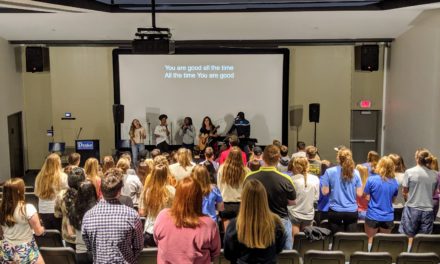A Big Deal about Small Groups
By Chris McRae, BCI Discipleship Team Leader
We began this series last week with an overview of the profound impact small group life can have on the vision and mission of a local church. I want to state again that when discussing small groups, the particular name used in any church doesn’t really matter all that much. Neither do time and place for the meeting amount to much importance. The issue that is at the heart of small group ministry is the purpose for which a group meets. Ultimately and finally the focus of any church Bible study, Life Group, Sunday School, Growth Group, or cell must be the making of disciples of Jesus Christ. Any other reason must take a position of secondary importance.
I don’t say that to suggest that additional reasons have no place of importance, but rather to help keep the focus on what is truly central. In this column today I want to explore one of the reasons why a great group life will change the life of your church and why every church should invest resources in building a vibrant, healthy, growing small group ministry.
Small Groups Meet the Real Need of Authentic Community
Belonging
This first point has to do with community. Let’s get it straight from the start. Community in real life is nothing like the sitcom featuring quirky misfits feeding off of and amplifying phobias and biases, afflicting and affirming one another in an “I’m okay, you’re okay” dystopic universe. Though humorous, this is a distortion of God’s vision for authentic Biblical community. If community at heart isn’t comedy or tragedy, neither is it of the safe but humdrum sort set in a Middle America suburban cul-de-sac living where in proximity, we wave politely and exchange banalities.
When it comes right down to it, community is more of a verb than a noun. It’s about life, not about where you live. There’s activity that’s involved. We have to be “doing” the work of community in order for community to be birthed and nurtured. What does it take to build an authentic Biblical community? Three qualities stand out.
Community is about communicating.
The summer before entering the fourth grade my dad was transferred to a position out of state. We packed up belongings, loaded the station wagon and headed from Virginia to Wisconsin. When we moved into our neighborhood on West Wells Street, ladies from the neighborhood would bring over meals and desserts. They wanted to introduce themselves to our family. It’s what took place when you moved into a new community. They would talk about the corner grocery store and the bakery, pharmacy, schools and parks that were nearby. Their goal was to make our family feel a part of their community. They did this by communicating: talking and listening. One of the hardest things I did in my childhood was to cross the street to knock on the back door of Tim’s house and ask if he could come out to play.
Taking that risk is what allows us to form friendships. We do the same in small groups…making newcomers feel welcome by talking to them. This is the first step in getting to know someone and allowing them into your life. Some folks are natural talkers, while others of us have to work at it. Regardless, you’ve got to talk to someone in order to get to know them. It starts with an introduction. Whether you make an acquaintance yourself or you are introduced to someone, you have to meet them in order to begin the process of welcoming them into your life. The more you talk, the more you get to know someone.
Community is about connecting.
In the 1940’s, a Swiss inventor and amateur mountaineer took advantage of a warm summer’s day and went for a hike in the alpine fields with his dog. Like other trekkers across the millennia, they returned home covered in cockleburs. As he sat on the back stoop pulling them free from his cloth jacket, he began to wonder if there was something useful that could be adapted from this nuisance. In a “eureka” moment, he abandoned his faithful friend to a burr infested misery and went into his laboratory to put a seed sac under a microscope. There he discovered the thousands of tiny “hooks” that caught in the “loops” of the fabric in his jacket. Thus was born what we know today as Velcro.
Community involves “sticking to” one another. Initial communication leads to connecting. Sometimes, the natural connections are formed in family, neighborhood, work and school associations. At other times, connections are made because we like the same kind of things. Sport, art, nature, and politics are affinities we may have in common. We build on these as we get to one another on ever deeper levels.
While we are initially drawn to people with similar likes and dislikes, there is a deeper hunger yet. Authentic biblical community is formed as we gather with others of like heart and mind who long to see the formation of Christ alive in their daily experience and who long to make a difference in the world for the sake of the eternal kingdom of God and for his glory. These are points that help us stick to others when it’s far easier to go it alone and keep busy doing our own thing. But that brings us to the final point about authentic biblical community.
Community is about caring.
Humanity has been disparagingly described as a cancer of the skin, on a microscopic planet, in a second class solar system, of a fringe galaxy, at the backwater edge of the universe. Talk about irrelevant! And yet the God of creation has intimate concern for this speck of dust. Ages ago a shepherd boy observed, “I look up at the heavens, your handmade jewelry of moon and stars strung across the dark, enormous sky. Then I look at my insignificant self and wonder…” He then asked rhetorically, “Why do you bother with us? Why do you take a second look?” God cares for us — the seemingly inconsequential. Just as he numbers and names each star of the heavens, he tends those who are sick and wounded, beaten and brokenhearted. God chose to love humanity.
We are taught that being honest to our true selves requires us to act out of a heart that is pure. If we “feel” right and our motives are sincere, then our acts of love are genuine. However, I want to argue that godly love is a choice. Choosing to act in kindness toward one another, regardless of our emotional state, is more Christ-like than waiting to be overwhelmed with care before acting. It is my observation that I end up liking people for whom I have chosen to care. It is in small group living that I’ve learned to kindly care for people. I’ve talked to them. I’ve come to know them in a personal way. We have connected because of a mutual desire to grow spiritually and to serve meaningfully. True community is formed when I take it to the next level by adopting an other-than-me attitude that puts the needs of someone else ahead of my own. And then I act on it.
Small groups provide opportunities for people to talk to one another, to connect with one another and to demonstrate God’s love toward one another. As we do these well, the world will take note and honor God.








